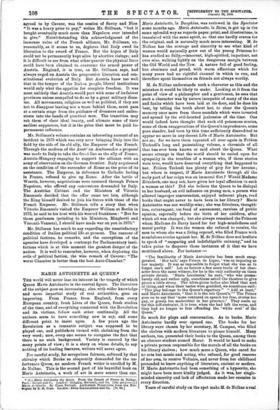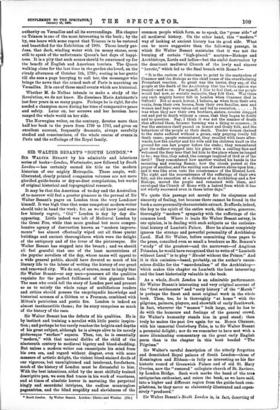MARIE ANTOINETTE AS QUEEN.*
THE world will never lose its interest in the tragedy of which Queen Marie Antoinette is the central figure. The literature of the subject goes on increasing; also, with wider knowledge and more impartial study of real authorities, goes on improving. From France, from England, from every European country, fresh Lives of the Queen, fresh studies of the time, and of everything connected with the Revolution and its victims, follow each other continually. All the authors seem to have something new to say, and some different point to insist upon. A few years ago the Revolution as a romantic subject was supposed to be played out, and publishers turned with shrinking from the very word; now, every one seems to recognise the fact that there is no such background. Variety is ensured by the many points of view ; it is a story on whose details, to say nothing of its leading features, writers will never agree.
For careful study, for scrupulous fairness, softened by that chivalry which Burke so eloquently demanded for the un- fortunate Queen, no modern French writer is excelled by M. de Nolhac. This is the second part of his beautiful book on Marie Antoinette, a work of art in more senses than one.
• (1 ) Marie Antoinette the Queen. From the French of Pierre de Nolbao. Pan,: Genpil and Co. London dimpkin, Morahan, and Co. [63s. net.)—(2.) Marie Alfognette. By Clara Tschudi. authorised Translation from the Nor- wegian by E. X. Cope. London: Swan Sounensohein and Co. [7e. 6d.] Marie Antoinette, la Dauphine, was reviewed in the Spectator some months ago. Marie Antoinette, la Being, is got up in the same splendid way as regards paper, print, and illustrations, is
translated with the same spirit, so that one hardly craves for the original, and is naturally much more interesting. M. de Nolhac has the courage and sincerity to see what kind of woman would naturally grow out of the young Princess ho has studied so fully,—innocent, high-spirited, impatient, not over wise, walking lightly on the dangerous margin between the Old World and the New. A nature full of good feeling, but obstinate and proud, with warm affections which for many years had no rightful channel in which to run, and therefore spent themselves on friends not always worthy.
M. de Nolhac understands such a character as this and the mistakes it would be likely to make. Looking at it from the point of view of a philosopher and a gentleman, he sees that such a character was by nature incapable of many of the sins and faults which have been laid at its door, and he does his best, by telling the truth about her, to clear the Queen's memory once more from those scandals which were invented and spread by the evil-hearted jealousies of the time. One would indeed have thought that such old poisonous stories, some of them exaggerations of the Queen's imprudences, some pure slander, had been by this time sufficiently discredited to appear no more in any decent Life of Marie Antoinette. But not so; for we have them repeated all over again in Froken Tschudi's long and painstaking volume, a chronicle of all that has ever been known or said about the Queen. What seems strange is that the world should be called upon for sympathy in the troubles of a woman who, if these stories were true, would have deserved everything that happened to her. Friiken Tschtidi has plenty of pity for her heroine; but where is respect, if Marie Antoinette through all the early part of her reign was an immoral flirt ? Would Madame Elizabeth, one may ask, have given her loyal affection to such a woman as this? Did she believe the Queen to be disloyal to her husband, an evil influence on young men, a person who allowed improper conversation, enjoyed indecent plays, read books that ought never to have been in her library ? Marie Antoinette was not worldly-wise; she was frivolous, thought- less, extravagant, too fond of amusement, careless of public opinion, especially before the birth of her children, after which all was changed; but she always remained the Princess whom Madame du Barry hated for her high-mindedness and moral purity. It was the women she refused to receive, the men to whom she was a living reproof, who filled France with scandalous stories against her. M. de Nolhac does not hesitate to speak of "unsparing and indefatigable calumny," and he takes pains to disprove those instances of it that we have mentioned above. For instance :—
" The familiarity of Marie Antoinette has been much exag- gerated. Her tact,' says Prince de Ligne, was as imposing as her majesty. It was as impossible to forget what she was as to forget one's self.' Let us borrow a few more traits of her char- acter from the same witness, for he is the only authority on these private details. 'Marie Leczinska,' he says, who was prema- turely old, and rather ugly, sometimes asked the theatres to give pieces a little strong. The ultra-pious ladies also liked that sort of thing, and when their tastes were gratified, we sometimes said : "This play belongs to the Queen's repertory." "Add at least," said Marie Antoinette, "that it is the late Queen's."' The Prince goes on to say that 'none ventured on speech too free, stories too gay, or gossip too malevolent in her presence.' They made up for this self-restraint, it is true, when she had left the room, and they had no longer to fear offending the white soul' of the Queen."
So much for plays and conversation. As to books, Marie Antoinette hardly ever opened one. The books for her library were chosen by her secretary, M. Campan, who filled the shelves with modern literature to please himself. Many authors, too, presented their books to the Queen, among them an obscure student named Marat. It would be hard to make a private person responsible for the morals of all the books on his library shelves ; how much more a Queen, who cared for no arts but music and acting, who refused, for good reasons of her own, to receive Voltaire, and never from her childhood pretended to know anything of literature, ancient or modern. If Marie Antoinette had been something of a hypocrite, she might have been more kindly judged. As it was, her single- minded sincerity and lack of affectation made her enemies in every direction.
Years of careful study on the spot make M. de Nola° areal .
authority on Versailles and all its surroundings. His chapter on Trianon is one of the most interesting in the book ; by the by, one hears with some regret that Trianon is to be restored and beautified for the Exhibition of 1900. Those lonely gar- dens, that dark, winding water with its mossy stones, seem still to speak of the unfortunate Queen's last days of happi- ness. It is a pity that such scenes should be smartened up for the benefit of English and American tourists. The Queen walking alone for the last time in the garden she loved, on the cloudy afternoon of October 5th, 1789; resting in her grotto till she sees a page hurrying to call her, the messenger who brings the news that the armed mob of Paris is marching on Versailles. It is one of those small events which are historical.
Whether M. de Nolhac intends to make a study of the Revolution, we do not know. He dismisses Marie Antoinette's last four years in as many pages. Perhaps he is right, for she needed a champion more during her time of comparative peace and safety. Later on, her sorrows and her heroism have ranged the whole world on her side.
The Norwegian writer, on the contrary, devotes more than half her book to the years from 1789 to 1793, and gives an excellent account, frequently dramatic, always carefully studied and conscientious, of the whole course of events in Paris and the sufferings of the Royal family.



















































 Previous page
Previous page